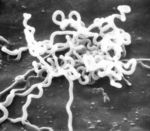Venereal disease

'Venereal diseases' are infections spread through sexual contact. When the term was coined, in the 19th century, sexual activity was the only common "intimate" means of sharing body fluids. Since that time, with the advent of blood transfusion, organ transplant, and groups of substance abusers who share hypodermic equipment for injecting drugs, some of the same fastidious organisms that could only survive transmission from an infected person to a new host through body fluids shared in sexual contact, are now also able to survive through these other forms of transport.
Some venereal diseases can be passed from an infected mother to her baby: either during pregnancy, birth, or through breastfeeding. This fact has changed the utility of breastfeeding in some areas, like sub-Saharan Africa, where the rate of HIV, which is transmitted in breast milk is very high. It also had an influence on the social mores of Europe, where, after syphilis became epidemic in the 15th century, women warned their daughters about the dangers of marrying the wrong man lest the children bring tragedy.
Sexually Transmitted Disease (STD) include both the venereal diseases and other infections. These other infections can be spread in many ways, but are so likely to be transmitted by sexual contact with an infected person that they are included in the category of sexually transmitted disease.
